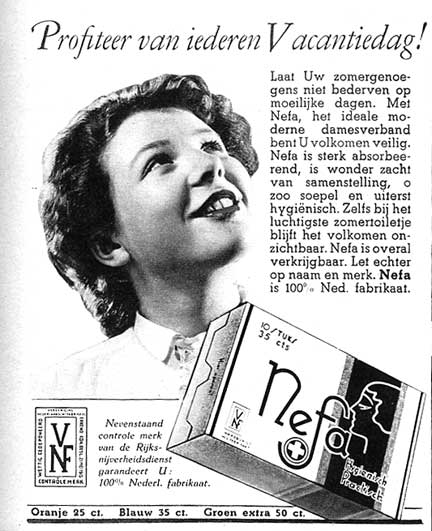See a Tampax
tampon ad a week later in the same magazine. Wrapped Kotex pad from
dispenser, 1930s, U.S.A.
Compare a more somber American
ad for Kotex from five years earlier
See Australian douche ad
(ca. 1900) - Fresca
douche powder (U.S.A.) (date ?) - Kotique douche liquid
ad, 1974 (U.S.A.) - Liasan
(1) genital wash ad, 1980s (Germany) - Liasan (2) genital wash
ad, 1980s (Germany) - Lysol
douche liquid ad, 1928 (U.S.A.) - Lysol douche liquid ad,
1948 (U.S.A.) - Marvel
douche liquid ad, 1928 (U.S.A.) - Midol ad, 1938 - Midol booklet
(selections), 1959 (U.S.A.) - Mum deodorant cream ad,
1926 (U.S.A.) - Myzone
menstrual pain pills ad, 1952 (Australia) - Pristeen genital spray
ad, 1969 (U.S.A.) - Spalt
pain tablets, 1936 (Germany) - Sterizol douche liquid
ad, 1926 (U.S.A.) - Vionell
genital spray ad, 1970, with Cheryl Tiegs
(Germany) - Zonite
douche liquid ad, 1928 (U.S.A.)
The Perils of Vaginal
Douching (essay by Luci Capo Rome) - the odor page
More Midol: Midol
booklet (selections), 1959, and Midol ad,
1938


|

Nefa
menstrual napkins (damesverband),
the Netherlands, 28 July 1936, ad in
Panorama magazine
This cheery black-and-white Dutch ad
for probably a native sanitary napkin
reads like many American ads in
promoting its product: you couldn't
buy anything better (see my
translation under the ad). Then again,
the company wouldn't write, "Oh, well,
it's pretty good, considering."
Look, the
model gazes up, not down, where the
pad is! (Other
upward-gazing models: for American
Tampax,
for German Carefree.
Looking down might indicate shame, a
thorny subject for these
companies.)
Read more about what women -
American, anyway - wanted in a pad in
Dr. Lillian Gilbreth's 1927 report to
Johnson & Johnson. Her children
would later write books about the
efficiency expert and her husband:
"Cheaper by the Dozen" and "Belles on
their Toes," which Hollwood made into
movies.
29 years later Nefa simplified its
logo (and lowercased its name) but
retained a Dutch-looking
model. Later on, Dutch menstrual
supplies manufacturers yielded to the
times and included dark-skinned
models - and men! - reflecting
immigrants from outside Europe and
Dutch liberalism.
I thank the generous Dutchman who
sent this ad as he has so many
others!
See a Tampax
tampon ad a week later in the same
magazine.
Compare a more somber American ad
for Kotex from five years earlier -
but it features invisibility,
mentioned in this ad. And it offers a
booklet to prepare for a daughter's
first menstruation, one of the famous
Marjorie May booklets.
|
 |
Thanks to a Dutch
e-mailer for help with a sentence!
"Take advantage of
every vacation day!
"Don't let difficult
days spoil your summer enjoyment. With
Nefa, the ideal sanitary napkin,
you're completely safe. Nefa is very
absorbent, wonderfully soft in
construction, oh so supple and utterly
hygienic. Even with the lightest
summer dress it remains completely
invisible. Nefa is available
everywhere. Make sure you have the
correct name and brand. Nefa is 100
percent made in The Netherlands."
There are ten pads per
box. I don't understand what
(translated) "Orange," "Blue," and
"Green" indicate unless it refers to
different sizes or count per box which
the colors identify.
"Ct" means cents.
|
See a Tampax
tampon ad a week later in the same magazine. Wrapped Kotex pad from
dispenser, 1930s, U.S.A.
Compare a more somber American
ad for Kotex from five years earlier
© 2005 Harry Finley. It is illegal
to reproduce or distribute any of the
work on this Web site in any
manner or medium without written
permission of the author. Please
report suspected violations to hfinley@mum.org
|
|



